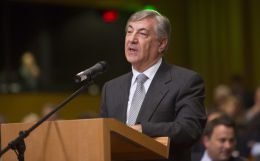The NFFO was recently part of a Europeche/EAPO delegation which met with the new Fisheries/Environment Commissioner, Karmenu Vella, who has recently replaced Maria Damanaki.
The contrast with the former Commissioner could hardly have been greater. Without prompting, Commissioner Vella expressed his eagerness to work with the fishing sector to resolve forthcoming challenges, and suggested a series of regular meetings with a mutually agreed agenda, with relevant officials in attendance. His view, expressed early in the meeting, that European fisheries should be managed in a way that does not sacrifice future sustainability but equally does not inflict unnecessary pain on fishermen in the short term, coincides exactly with ours.
The Commissioner also seemed to appreciate that fleet diversity is a vital component in a balanced fishery sector. Both small-scale fisheries and larger vessels have a vital but different role to play in providing employment, economic well-being, and continuity of supply, that is an essential part of food security. It was made clear to the Commission that the fishing organisations represented within Europeche/EAPO reflected that fleet diversity, with a membership comprised of both large offshore and external waters vessels and small-scale inshore boats.
Fishing Pressure and Stock Status
Europeche/ EAPO asked the Commissioner to pay close attention to ICES scientific advice which confirms that after 70 years of incremental increases, since the year 2000, there has been a dramatic reduction in fishing mortality across all the main species groups in the North East Atlantic. Stocks were responding, as expected, to this reduction in pressure. Some, like North Sea plaice, had rebuilt very dramatically, above anything seen in the historic record, whilst others, depending on local circumstances and recruitment, are rebuilding at a different pace. The Commissioner heard that the positive direction of stock trends, well reflected in the science, contradicts the doomsayers, who grab far too much media attention with their sensationalist catastrophe narrative.
Top-Down
The point was made to the Commissioner that the progress that has been made over the last twenty years, in putting the CFP on a rational and sustainable footing, has been done at a high and unnecessary cost. The history of the CFP, across structural policy, technical measures, resource policy, cod recovery/management plans, has been one in which successive initiatives had either failed completely or delivered much less than hoped for. In some cases they had made matters worse. It was now widely accepted that a top-down one-size-fits-all approach applied to the multiple diverse fisheries under the CFP umbrella would always be doomed to failure. The recent reform of the CFP had provided for regionalisation, the first step in a necessary decentralisation of decision-making in fisheries. However, Commission proposals, such as the ill-considered proposed ban on small-scale drift nets suggested that there remained some elements of the old, discredited ways of thinking within the Commission. It was important to evolve away from a model of governance that simply doesn’t work.
The Commissioner acknowledged the force of this argument and pointed to the new technical measures framework, on which the Commission is currently working, which would reserve broad brush measures for where they are absolutely necessary and would otherwise devolve detailed decision-making to the regional level and below.
Science
The meeting provided the opportunity to explain to the Commissioner, the transformation in relations between fishermen and fisheries scientists that had taken place over the last decade. Changes had taken place in both the industry’s mindset but also ICES’s attitude to engagement with fishermen and fishing organisations. Fishermen’s Organisation’s and the advisory councils now struggle to accept all the invitations offered by ICES to attend data-compilation, benchmark, and science strategy meetings. Fisheries-Science partnerships of all kind have mushroomed, in which scientists work on board commercial fishing vessels to gather data and strengthen knowledge. All this amounts to a revolution in the relationship between fishermen and scientists.
Range of Discussions
An extensive range of issues were covered during the course of the meeting, which went on well after its allotted time. Market issues, fishing vessel safety, external waters fisheries, marine strategy framework directive, EU Norway, data-limited fisheries, maximum sustainable yield, as well as the impending landings obligation, were all discussed in more or less detail.
Conclusions
This was a highly constructive meeting which offers the prospect of a much better working relationship with the Commission than seen during the former Commissioner’s period of tenure. Both the Commissioner and Europeche/EAPO expressed their commitment to work together in the main policy areas and the Commissioner seemed to have a balanced view of his dual role as Commissioner of both Environment and Maritime Affairs.
Despite having been in the post for a relatively short period, the Commissioner, displayed an impressive grasp of the detail required to understand both the issues but also the labyrinthine politics associated with managing fisheries these days.
Time will tell whether this positive start signals a new era, or continuation of the same business under new management. We hope and will work on the basis that it is the former.

